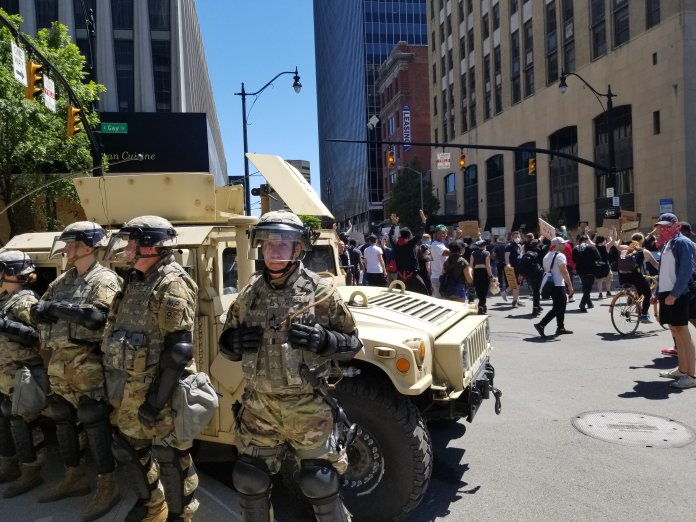Gov. DeWine had deployed Ohio National Guard to Cleveland, Columbus, D.C. Taxpayers will foot the multi-million dollar bill for the Ohio National Guard’s response to recent protests in Cleveland and Columbus.
The total cost as approved by the Ohio Controlling Board on Monday comes to $3.2 million for the deployments beginning on May 30.
Gov. Mike DeWine had stationed over 1,000 members of the guard in the two Ohio cities at the request of their mayors. Clashes between protesters and local police departments had escalated in the preceding days. DeWine said at the time he was sending in the National Guard “to drive out hate and violence and to instill order.”
DeWine also sent 100 members of the guard to D.C. at the request of the Secretary of Defense. Ohio was one of nearly a dozen states to send their respective guards to Washington.
Mayor Murial Bowser later asked DeWine to remove those Ohio guard members, and shortly after President Donald Trump ordered them to return home.
The funding approved by the Ohio Controlling Board only pays for active duty in this state, according to Stephanie Beougher, the public information officer for the Adjutant General’s Department.
“The support to the District of Columbia National Guard was federally funded,” Beougher added.
One Ohio guard member sent to D.C. was suspended and sent home early after it was discovered the guardsman had expressed white supremacist ideology online.
DeWine announced on June 10 the guard would be pulled out of Columbus and Cleveland as well.
The Ohio Controlling Board met Monday afternoon to vote on more than 100 funding requests. The Board is made up of the Office of Budget and Management’s director, along with six legislators from both parties and both chambers.
One funding request came from the Ohio Adjutant General’s Department, which leads the Ohio National Guard.
That department requested $3.2 million “to support state active duty costs incurred as a result of civil unrest beginning May 30, 2020.”
Nearly all of that amount, $2.9 million, is allocated for payroll. Another $300,000 is for “supplies and maintenance.”
Asked if any of that $2.9 million paid for overtime, Beougher said: “Ohio National Guard members, whether on state active duty or federal deployment, do not accrue overtime or receive overtime pay.”
All members of the Ohio Controlling Board approved the funding, with the exception of state Sen. Vernon Sykes, D-Akron, who voted against. Sykes asked several questions about the National Guard’s work during a discussion preceding the vote with Jeff Newman, the chief financial officer for the Ohio Adjutant General’s Department.
“We try to be good stewards,” Newman said about funding. “Nobody’s getting rich on this deal.”
Newman described the cost as being “a matter of supply and demand, and the people with the supply often have us over a barrel.” He noted the high costs of feeding and housing more than 1,000 guard members in multiple cities.
Note: This story has been updated to include details from a public information officer to the Adjutant General’s Department. Also, an original version of this story incorrectly stated the Ohio Controlling Board funding paid for duty in Ohio and Washington, D.C.; as now reported, the funding pays only for duty in Ohio.
***
House lawmakers leave racism resolution on the table
A resolution declaring racism a public health crisis did not receive a hearing before the Ohio House of Representatives left for their summer break.
The Ohio Legislative Black Caucus announced the measure at the beginning of the month, and it was referred to the House’s State and Local Government Committee on June 3. The bill has 32 cosponsors, all Democrats.
A companion Senate resolution received a hearing in which hundreds of individuals submitted supportive testimony, and the chair of the Senate Health, Human Services & Medicaid Committee said a second hearing is planned for further proponent testimony. It now has three Republican cosponsors. READ MORE
U.S. Supreme Court ruling protects LGBTQ workers from job discrimination
WASHINGTON — In a landmark victory for LGBTQ rights, the U.S. Supreme Court held Monday that employers can’t legally fire people because of their gender identity or sexual orientation.
In a 6-3 opinion, the court ruled that employers who fire individuals “merely for being gay or transgender” violate Title VII of the 1964 Civil Rights Act, which bans discrimination on the basis of sex and other characteristics — but not specifically gender identity or sexual orientation.
Conservative Justice Neil Gorsuch, President Donald Trump’s first appointee to the high court, and Chief Justice John Roberts sided with the court’s four liberal justices in the case. Justices Samuel Alito, Clarence Thomas and Brett Kavanaugh filed dissenting opinions.
“An employer who fires an individual for being homosexual or transgender fires that person for traits or actions it would not have questioned in members of a different sex,” wrote Gorsuch, who authored the majority opinion. “Sex plays a necessary and undisguisable role in the decision, exactly what Title VII forbids.” READ MORE





